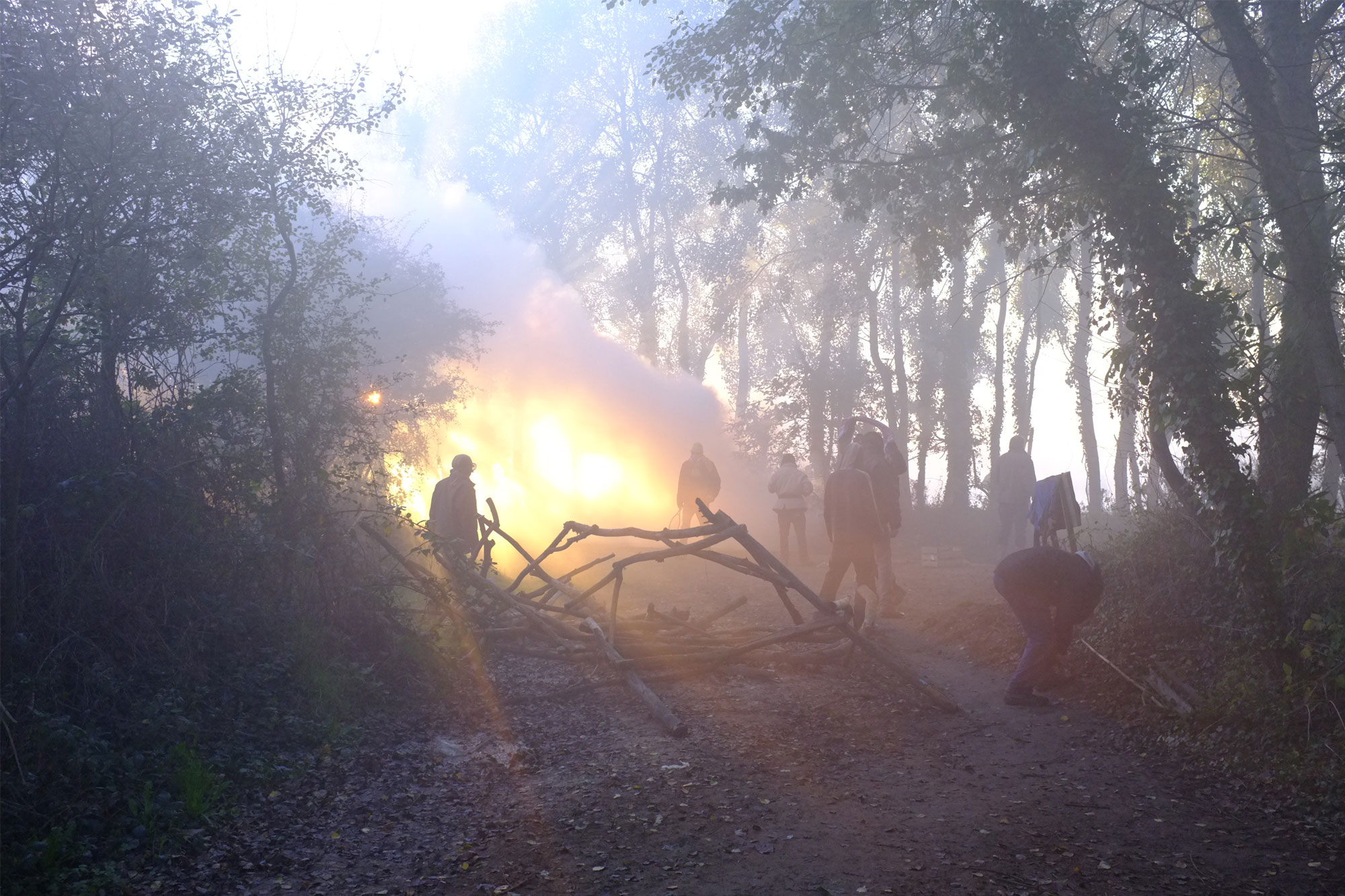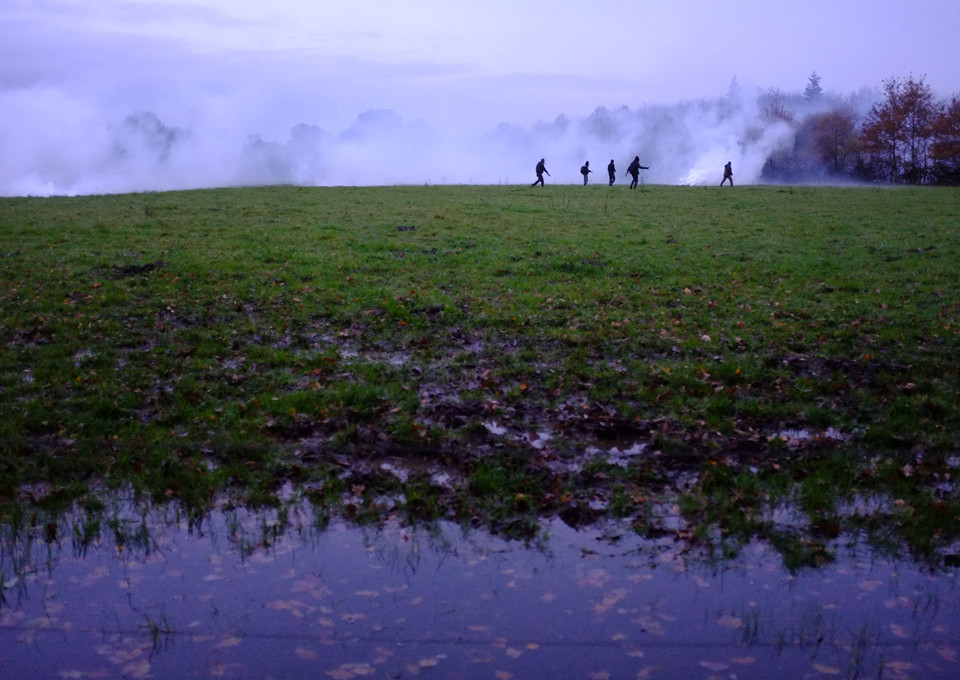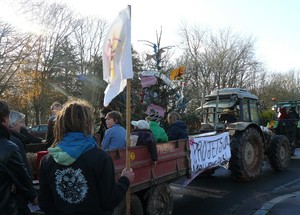This is part two of a two-part series on the Notre-Dame-des-Landes Zad, in Western France. Read part one here.
Part 2: The struggle and victory of the collective at the zad
It’s the 12th of April 2013, and the deep, damp autumn and winter we have dragged ourselves out of gives way to the first buds of spring, bathed in the light of a sun we have been waiting so long for. The gendarmes have finally left the bocage; meanwhile, the government has announced that the airport will absolutely get built – “one day”. But in the streets of Nantes and between the hedgerows, in the local committee meetings and the common assembly at the Vache-rit, there is a shared sense that victory is within reach. And so the demand “No airport” becomes a certainty, one which we will never let go of: There will never be an airport at Notre-Dame-des-Landes.
The next day is Sème ta zad (sow your zad). Several thousand people wielding spades and pitchforks converge onto the D281, the road that cuts straight through the centre of the zad and which is still punctuated by our makeshift chicanes. Out of the middle of the road rises a lookout tower called “Bison Futé”, whose slender wooden frame defies the very concept of a straight line. Crops grow once again in the fields, which are still littered with teargas canisters. Gardens are planted in some of the new spaces that were settled during the winter: la Wardine, les 100 noms, les Rouges et Noires. At Saint-Jean-du-Tertre we plant grape vines which will take several years before they provide us with wine. New huts and cabins are mushrooming everywhere, built to a wild soundtrack ringing from the four corners of the bocage, the irrepressible rhythm of hammering.
With the defeat of Cesar a new page of the struggle is turned. For several months at least, and perhaps several years, we feel like the zone is ours. The feeling of freedom is exhilarating, its intensity of a similar degree to the challenges we face. While the police have been ordered not to venture onto the zone anymore, power does not just evaporate. It just retreats to adapt its strategy, and hopes that its absence will give way to unavoidable chaos, which, in turn, will justify its return.
After Operation Cesar, our numbers swell. There have never been so many of us here, nor such diversity; we are living in a thousand different ways on the zad. There are those for whom la zad is a refuge because there are no identity controls: from minors running away from home to refugees from Calais who failed to make it to England. There are those worn down by the distress of living rough on the streets, for whom the zad is a haven. There are those who arrive to set up home, attracted by the utopias this place promises. Added to all this is the constant passing through and intermingling, which, while sometimes exhausting, is further testimony to the hope and curiosity that the magic of the zad awakens.
*
The effervescence of this unique situation at the zad, along with the absence of a controlling power, offers us the opportunity to grapple directly with the things that condition our everyday life, materially and otherwise. Faced with the challenge of sharing our lives, we step into another battle, this time against and within ourselves. It’s no longer about confronting power in its most obvious form, but struggling against that which is embedded deep within us. Parts of us, stuck in our social, cultural and political identities, remain separated. The defeat of a police operation will never be enough to completely destroy the grip of consumerism within us, the devastating addictions, the prejudices, the everyday sexism. How do we free ourselves from the cowardly habit of wanting to delegate everything, which sits so well next to the deadly desire to control everything?
The conflicts that emerged in the bocage, whether they were about the uses of common property or a political disagreement or a physical assault, are not so different from those that appear in a neighbourhood or village. Except, on the zad, there is no superior and hegemonic body to arbitrate or intervene. We have to come to grips with all these complex issues that we normally swiftly silence or entrust to whichever expert institution: the police, courts, psychiatric hospitals, the local council, the chamber of agriculture.
For months we dedicate ourselves to learning the fine art of give and take, which enables us to transcend differences and disagreements without ironing out our ethical arguments and fertile tensions. In the spring of 2013, squabbles erupt over access to agricultural land, perfectly illustrating the difficulties of our steep learning curve. Conflicts arising around land use reveal a clash of perspectives: that of the earth as a tool of work, and that of nature as something to be left alone and protected from the degradation of human activity.
We are not interested in self-sufficiency for its own sake. What is happening here is political autonomy. What we are inventing, through trial and error, is the capacity to collectively decide our own rules.
This opposition, at first, feels utterly unreconcilable, but we eventually move on via the tortuous path of experience. Step by step, we are able to combine the collective reclaiming of this territory by its inhabitants, the sharing of some of its resources – agricultural land, woods, roads and lanes, etc – and an attentiveness to the importance of saving areas for their own sake, and not just because they answer to human needs. Through the confrontation of very different sensibilities and the resulting conflict – the harshness of which no one can deny – a certain collective intelligence emerged.
*
We come together every week around what you might believe is a market, although at this market everything is donated and nothing is sold. The market enables us to share some of the produce of the land, its surplus used to feed other struggles, at street kitchens or migrant squats in the city of Nantes.
A myriad of other experiences in autonomy are flowering, outside of the logic of management and the market. That which was already germinating before the evictions takes on a new dimension. A sewing and textile workshop appears, or a bike maintenance project; a place to make preserves, a micro-brewery, a new bakery, a restaurant in a wooden carriage, a flour mill, a space for writing and recording rap songs, a dance hall and lessons in self-defence.
We work on taking back control of our health via medicinal herb gardens and medical training, offering first aid to those injured by the police’s weapons. We aim to build our own communication network, from our website to the FM radio. Every week we put together a newsletter, which brings together a calendar of events, minutes of meetings, stories and rants. It’s delivered by “postmen” on foot or bikes, to the sixty places where people live on the zone.
We explore different ways of partying, a million miles away from the trendy clubs and the entertainment industry: a fest-noz (traditional breton dancing) to inaugurate the arrival of a new barn, which, despite being banned by the authorities, makes its way from the Finistère, on the far western edge of Brittany. To celebrate the end of the threshing season we hold a sixty-metre-long banquet among the hay bales and wheat dust. At night we fall into trance in barns covered in graffiti, to the sounds of experimental music or the bewitching voice of an opera singer. We look after parts of the hedgerows, the lanes, the electricity grid and the water supply via regular collective work days. We build more structures, without any planning permission but with tonnes of architectural creativity, using recycled materials, earth, straw or even sometimes timber from trees felled on site and cut up on a mobile saw mill some friends have brought halfway across France. We doggedly strive for ways to agree on the uses of our commons, expanding the possibilities of what can be shared and tightening the bonds that hold us.
*
The autonomy that is being experimented with here in the bocage can’t be reduced to our food and material elements. We are not interested in self-sufficiency for its own sake. What is happening here is political autonomy. What we are inventing, through trial and error, is the capacity to collectively decide our own rules. A multitude of decision making spaces for autonomous deliberations and organising have poured into the cracks that were opened up by the withdrawal of power, a power which is thus being sapped, little by little.
In these spaces are the weekly meetings of the occupiers and the assemblies of the movement, which follow one another with such reliability that it can sometimes resemble the steadfastness of traditional institutions. Then there are the dozens of living collectives where we share everyday life, love, friendship, political affinity and beautiful encounters, the bedrock of daily solidarity that has held the zad together for so many years. It is this constant effervescence that conspires against the possibility of anyone taking power. It is what makes it impossible for an element of the struggle to become hegemonic, or for any leader to hold in their hands the fate and messaging of the movement.
There is something of the commune in what we are weaving together at la zad. Something of the Commune of 1871, when an irresistible collective feeling seized the inhabitants of Paris, who became, behind the barricades, masters of their own histories and daily life, giving rise to huge revolutionary hopes and sparking off uprisings in many other towns. There is something of the medieval communes who managed to rip themselves free from the grip of feudal power and defend the commons, these lands, tools and resources to be used in common with others. There is something of the short-lived 1968 commune of Nantes, during which students and workers occupied the town hall, brought the region to a standstill and organised supplies for those on strike with local farmers. Something which, from now on, is both the means and the meaning of our struggle, and that we have to continue to deepen. These imaginings feed the bocage of Notre-Dame-des-Landes in the quest for a desirable present and a possible future.
*
We must defend the zad. We must defend it as an experience and as a collective force of resistance set in a corner of a bocage which has brought together and inspired tens of thousands of people over the years. If the police insist on returning, we are calling for people to face up to them and defend the zone, tooth and nail, by blocking the entire region, by occupying institutions of power and holding banquets in the squares of their towns and villages. We call for ever more actions to force the immediate abandonment of the airport project, and ensure that this effervescent political experiment in the bocage carries on.
But we must also defend the zad as a historical possibility, one that has already become contagious and that can be realised in a thousand different places, in a thousand different ways. We call for the spirit of the zad to continue to spread, taking a unique path every time, but with the desire to open cracks everywhere. Cracks in the frenzy of security measures, cracks in the ecological disaster, cracks in the tightening border regimes, cracks in the omnipotent surveillance, cracks in a world that puts everything up for sale.
In these disenchanted times, the zad and all that it represents, like the struggles of yesteryear and elsewhere, is a glimmer of hope in the here and now.
We must defend the zad, in Notre-Dame-des-Landes and everywhere.
This piece was adapted from ‘Defending the Zad’, with images from The Laboratory of Insurrectionary Imagination. Read Part 1 here. For more recent updates on the zad, visit the Zad Forever blog.
Gallery





